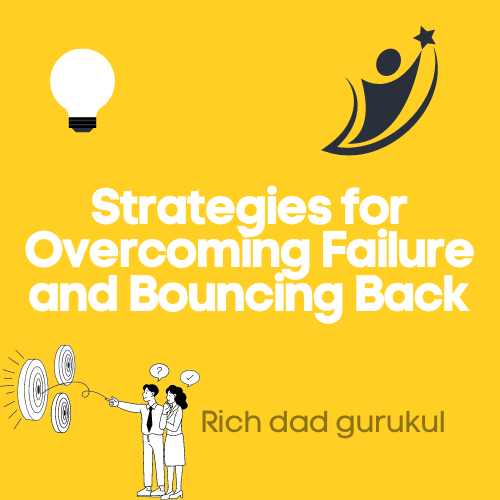Strategies for Overcoming Failure and Bouncing Back
Strategies for Overcoming Failure and Bouncing Back
Failure is an inevitable part of life. Whether it’s a small setback or a major defeat, everyone experiences failure at some point. But the difference between successful and unsuccessful people lies in how they handle failure. Successful individuals use failure as a learning opportunity and bounce back stronger than ever. In this article, we will explore some strategies for overcoming failure and bouncing back.
Reframe your perspective: Instead of seeing failure as a negative experience, reframe your perspective and view it as a valuable opportunity for growth and learning. Use the lessons learned from your failures to improve your skills, knowledge, and approach to future challenges.
Practice self-compassion: Be kind to yourself and practice self-compassion. Acknowledge that failure is a natural part of the learning process, and don’t be too hard on yourself for making mistakes.
Set realistic goals: Setting realistic and achievable goals can help you avoid disappointment and reduce the likelihood of failure. Make sure your goals are specific, measurable, and attainable.
Develop a growth mindset: Adopt a growth mindset, which is the belief that your abilities and intelligence can be developed through hard work and dedication. Embrace challenges as opportunities to grow and learn.
Stay positive: Maintain a positive attitude, even in the face of failure. Focus on the lessons learned and the progress made, rather than dwelling on the negative aspects of the situation.
Learn from feedback: Seek feedback from others, and use it to improve your performance. Listen to constructive criticism with an open mind and a willingness to learn.
Take calculated risks: Taking calculated risks can lead to great rewards. Identify the potential risks and benefits of a decision, and weigh them carefully before taking action.
Practice resilience: Resilience is the ability to recover quickly from setbacks and adversity. Practice resilience by developing coping skills, building a support network, and taking care of your physical and mental health.
Embrace change: Change is inevitable, and it can be difficult to navigate. Embrace change by being adaptable, flexible, and open-minded.
Keep moving forward: Remember that failure is not the end. Keep moving forward, and use the lessons learned to guide your future decisions and actions.
In conclusion, failure is an opportunity for growth and learning. By reframing your perspective, practicing self-compassion, setting realistic goals, adopting a growth mindset, staying positive, learning from feedback, taking calculated risks, practicing resilience, embracing change, and keeping moving forward, you can overcome failure and bounce back stronger than ever. Remember, success is not about avoiding failure, but rather how you handle it when it occurs.

